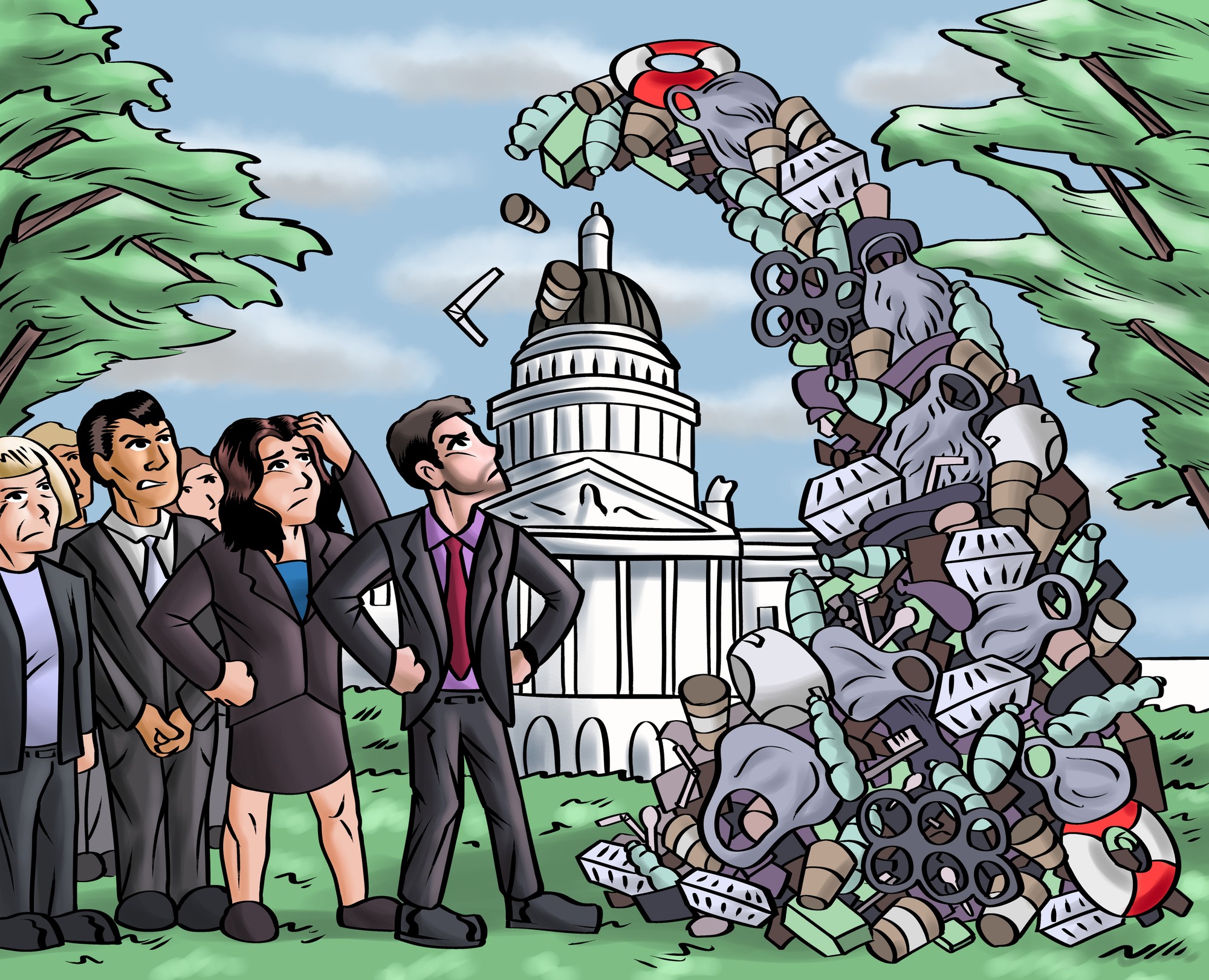Legislative act could create catalyst in reduction of statewide plastic waste

(Cody Wilson/Daily Bruin)
By Alexis Duke
Sept. 2, 2019 11:26 p.m.
A new set of bills could largely reduce the production of single-use plastic in California by 2030 if passed.
Senate Bill 54 and Assembly Bill 1080, collectively called the California Circular Economy and Plastic Pollution Reduction Act, are identical companion bills that aim to reduce single-use packaging and product waste in California by 75% by 2030. The two bills were proposed by Sen. Ben Allen, who represents parts of southern and western Los Angeles county, and Assemblywoman Lorena Gonzalez, who represents southern San Diego.
These bills come in the wake of a global plastics crisis, a spokesperson from Allen’s office said in an email statement. The spokesperson said Allen believes banning one product at a time is not working, and a comprehensive approach targeting the most problematic products will be more effective.
The bills mandate California’s Department of Resources Recycling and Recovery, known as CalRecycle, to enact a scoping plan by 2023.
The scoping plan aims to investigate the logistics of implementing the bill by communicating with stakeholders about feasibility and participation. CalRecycle also needs to develop economic strategies incentivizing green production and discouraging distribution and improper disposal of single-use packaging and products, as well as determine the strength of the state’s waste management infrastructure, according to the latest version of the bills.
CalRecycle would then be responsible for enacting and enforcing regulations that require producers to reduce single-use packaging and ensure it is either recyclable or compostable by the beginning of 2024.
The bills were introduced December 2018 but have since undergone changes after discussion between legislators and interest groups.
UCLA faculty and students are optimistic about the bills and believe them to be a necessary push toward protecting the environment.
Julia Stein, supervising attorney for the Frank G. Wells Environmental Law Clinic and project director for the Emmett Institute on Climate Change and the Environment at UCLA School of Law, said despite this conflict, she thinks the bills are likely to pass.
However, the target goal of 75% waste reduction by 2030 might be changed as CalRecycle determines the goal’s feasibility with current state infrastructure, she added.
“There’s no question that it will have an impact on reducing plastic waste, I think the question is how big that impact will ultimately be,” Stein said.
Magali Delmas, a professor and the director of the UCLA Center for Corporate Environmental Performance, said she hopes this bill will encourage entrepreneurs to create and promote plastic alternatives. Those alternatives will make the transition both easier and more economically desirable for businesses, she added.
“We have a very vibrant entrepreneurial economy in California in particular,” she said. “If making these changes were easy, we would have done it already. That’s why we need regulations to provide the right kind of incentive for people to change, to look for these solutions and make them more economically viable.”
Ethan Elkind, director of the Climate and Business Program at UC Berkeley School of Law and at UCLA School of Law, said achieving the waste reduction goal proposed by the bill is necessary for protecting not only the health of the environment, but of humans as well.
“We also have a major problem with plastics in the ocean – not just the explosion of garbage, but also microplastics,” he said. “These plastics start to break down, and they’re being ingested by marine life, including marine life that we humans are eating. That’s a real public health problem.”
Delmas said she hopes the mentality around recycling will change as a result of this bill.
“We think of recycling as kind of an engineering system,” she said. “We don’t really know how things happen, we don’t know where things go, how they are recycled, and we are in some ways left out of the system.”
She added she hopes this bill spurs public involvement with recycling and helps educate people on how they can become part of the system.
Sithara Menon, chair of the UCLA chapter of the California Public Interest Research Group and a third-year biology student, said she was excited the bills took strong action on businesses to make environmentally responsible decisions.
“It’s cool to see that we know a lot of these problems we’re seeing in the environment like pollution are coming from things we don’t need and shouldn’t be using,” she said.
Menon added she will also be coordinating efforts on campus to reduce waste with the eventual goal of getting UCLA to stop using single-use plastics and plastic containers.
“We know that the UC system is committed to going zero-waste, so we’re hoping that we can get UCLA to lead the way on this by committing to stopping using single-use plastics on campus,” she said.
SB 54 and AB 1080 have passed their respective houses of origin and are currently being voted on in the opposite houses.

